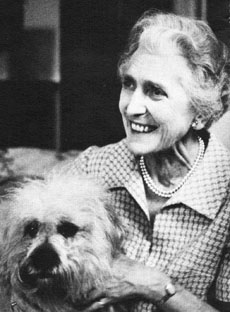Elizabeth Goudge facts for kids
Quick facts for kids
Elizabeth Goudge
|
|
|---|---|
 |
|
| Born | Elizabeth de Beauchamp Goudge 24 April 1900 Wells, England |
| Died | 1 April 1984 (aged 83) Rotherfield Peppard, Oxfordshire |
| Pen name | Elizabeth Goudge |
| Occupation | Writer |
| Nationality | British |
| Period | 1934–1978 |
| Genre | Children's literature, romance |
| Notable works |
|
| Notable awards | Carnegie Medal 1945 |
Elizabeth Goudge (born April 24, 1900 – died April 1, 1984) was a famous English writer. She wrote many books for both adults and children.
One of her most well-known books is The Little White Horse. This book won the Carnegie Medal in 1946. This award is given to the best children's book published in the UK each year. Elizabeth Goudge's stories were very popular in her time. Years later, her book The Rosemary Tree was copied by another author. Also, the famous author J. K. Rowling, who wrote the Harry Potter series, said that The Little White Horse was one of her favorite books and influenced her own writing.
Contents
About Elizabeth Goudge's Life
Early Life and Education
Elizabeth Goudge was born on April 24, 1900, in Wells, Somerset, England. Her father, Henry Leighton Goudge, worked at a theological college there. Her mother, Ida de Beauchamp Collenette, came from Guernsey.
Her family moved several times because of her father's work. They lived in Ely and then in Christ Church, Oxford, where her father became a professor at Oxford University. Elizabeth went to Grassendale School and later studied art at University College Reading. She also taught design and handicrafts for a while.
Moving and Writing
After her father passed away in 1939, Elizabeth and her mother moved to Marldon, Devon. They had planned a holiday there, but World War II started, so they decided to stay. They lived in a small house built for them.
Elizabeth Goudge used Marldon as the setting for several of her books. These include Smoky House (1940), The Castle on the Hill (1941), Green Dolphin Country (1944), The Little White Horse (1946), and Gentian Hill (1949). After her mother died in 1951, Elizabeth moved to Oxfordshire. She lived there for the last 30 years of her life in a cottage near Henley-on-Thames.
Elizabeth Goudge died on April 1, 1984.
Her Writing Journey
Elizabeth Goudge's first book, The Fairies' Baby and Other Stories, was published in 1919. However, it did not sell well. It took several years before she wrote her first novel, Island Magic, which came out in 1934. This book was a big success right away.
Island Magic was inspired by stories from the Channel Islands. Elizabeth had heard many of these stories from her mother. She often visited Guernsey as a child and spent many summers there with her grandparents.
Her book The Little White Horse, published in 1946, was very special. It won the Carnegie Medal for being the best children's book by a British author that year. Elizabeth herself said it was her favorite among all her works.
In 1960, Elizabeth Goudge helped start the Romantic Novelists' Association. She later became its vice-president.
Main Ideas in Her Books
Elizabeth Goudge's books often have Christian ideas. They talk about themes like sacrifice, becoming a better person, healing, and growing stronger through challenges. Her novels, whether they were realistic, fantasy, or historical, often included old legends and myths. They also showed her deep love for England and a spiritual feeling. These qualities made her books popular for both adults and children.
Elizabeth Goudge once said she only truly loved three of her books: The Valley of Song, The Dean's Watch, and The Child from the Sea. She felt that The Child from the Sea, her last novel, was special because its main idea was forgiveness. She believed forgiveness was the most important grace and something everyone needs.
When Her Work Was Copied
In 1993, a book called Cranes' Morning by Indrani Aikath-Gyaltsen was published. This book was praised by big newspapers like The New York Times and The Washington Post.
However, a reader soon noticed something strange. They realized that Cranes' Morning was almost exactly the same as Elizabeth Goudge's book The Rosemary Tree, which was published in 1956. The story had been copied without permission. The new book had changed the setting to an Indian village, changed character names, and switched the religion to Hinduism. But many parts of the story were word-for-word the same. This caused a scandal once it was discovered.
Influence on Other Writers
J. K. Rowling, the author of the Harry Potter books, has said that The Little White Horse was her favorite book when she was a child. She also mentioned that it directly influenced her Harry Potter series. Elizabeth Goudge often described what her characters were eating in her books, and J. K. Rowling liked this detail. You might notice that food is often mentioned in the Harry Potter books too!
Books Made into Movies
Elizabeth Goudge's book Green Dolphin Country (1944) was made into a film called Green Dolphin Street. This movie won an Academy Award in 1948 for its special effects, which included showing a big earthquake.
Also, the TV mini-series Moonacre and the 2009 film The Secret of Moonacre were both based on her book The Little White Horse.
Awards and Honours
- Metro-Goldwyn-Mayer Annual Novel Award, 1944, for Green Dolphin Country.
- Fellow of the Royal Society of Literature, 1945.
- Carnegie Medal, 1946, for The Little White Horse.
See also
 In Spanish: Elizabeth Goudge para niños
In Spanish: Elizabeth Goudge para niños

